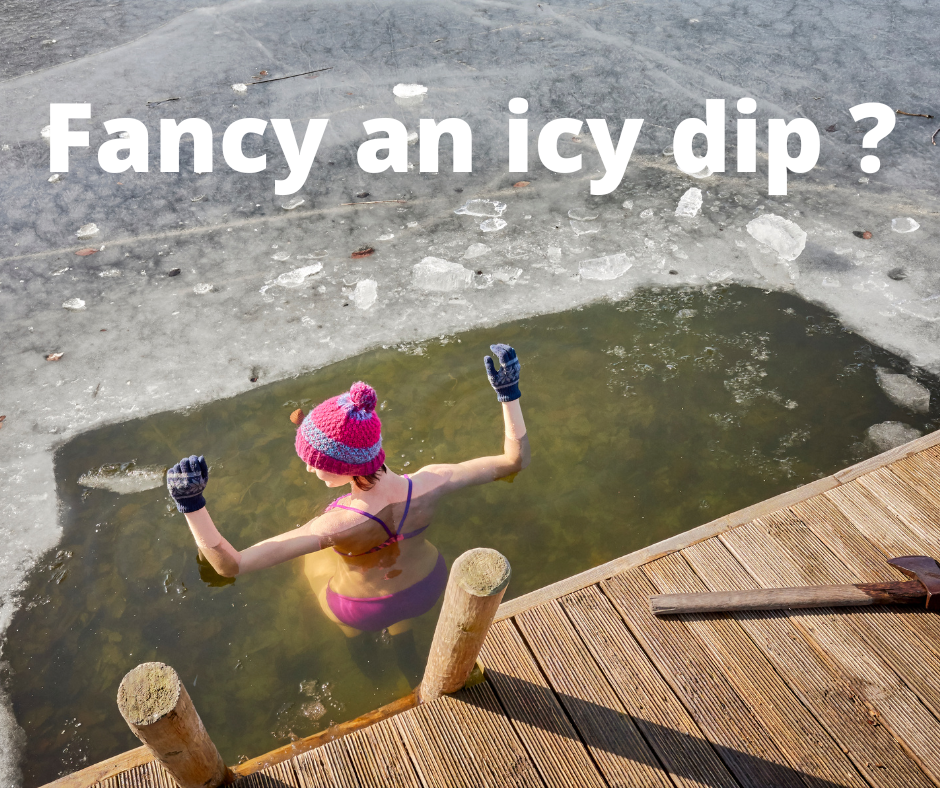There’s a real movement at the moment around cold water swiming, or plunging into ice baths and/or cold showers.
But how good is it for us ?
And before we dive in , yes pun intended, it’s always good to know the risks involved as well.
Pro’s
Several studies have found that this type of swimming has a wide variety of health benefits,.
Ranging from increased tolerance to stress, boosting self esteem, decreasing inflammation, improving your skin so you look more ‘radiant’ and it can even be can be used as a mindfulness exercise.
Now not everyone wants to do it & that’s okay.
Here’s a few of the benefits;
Increased tolerance to stress
The temperature of the water on the body makes it react, in the same way as it reacts to stress, so ‘fight or flight’, the hormone cortisol is released & both breathing & heart rate increase.
As your body gets used to the temperature the stress reaction gets less and it’s been suggested that the more cold immersion you do, then the more the body gets used to it, so the stress reaction gets less each time.
The reducing stress response applies to to other stressful situations, not just cold water swimming.
Boost self esteem
Forcing yourself to stay in the water, can help push you out of your comfort zone, build confidence & boost your self esteem.
Decreased inflammation
We all know that top performing atheletes use ice baths to help recover from events.
The cold temperatures makes your body send your blood away from your extremities towards your organs in your core.
The low blood flow in your limbs allows your muscles to recover more quickly & drecreases inflammation.
This effect applies whether you’re taking an icy dip, or an ice bath.
Cons
Immersing yourself in cold water comes with risks.
So before you get started, make yourself aware of the risks that come with this ever increasing popular activity.
Here’s a few;
Cold shock
One of the bigegst risks is the cold, causing peole to get into trouble or drown.
It’s not hypothermia as most people think.
Most water temperature in the UK is lower than 15 degreees.
When you enter the water, you get the stress reaction, as well as cold shock, which is a gasp reflex.
If you are under the water, or a wave is washing over you at the time of this reflex, you may inhale some water & you don’t need to inhale too much, for it to cause a problem with your breathing.
After the cold shock, comes a period of hyperventilation, so breathing becomes more rapid, which you can’t control – this can cause panic.
This can lead to getting into difficulty, or drowning, especially if you’re out of your depth.
If you’re new to cold water swimming, it’s really important to stay where you can keep your feet down when entering, as this can really help if you start to panic.
Cold incapacitation
This is where you get too cold.
After a few minutes of getting in, your body gets used to the cold & it can feel quite pleasant.
Then you decide to swim across the lake, you’ve got halfway across, then your body starts to feel cold again.
Your body moves the blood to the organs in the core to try & keep warm, but this can mean a loss of power in your muscles & your limbs become heavy & slow.
This is cold incapacitation, which can result in difficulty in swimming and lead to drowning.
Staying nearer the shore is safer and not letting yourself become too cold.
Risks from existing medical conditions
It’s always best to get medical advice before starting cold water wimming in the winter.
If you suffer from a heart condition, high blood pressure, asthma or pregnant it’s a must.
The cold water can increase the risk of irregular heart rhythms (arrhytmias) & even cardiac arrest, so it isn’t suitable for everyone.
And of course, going with a friend is more fun and is alot safer than going on your own.
Let me know if you’re a regular cold water swimmer.
Claire x
